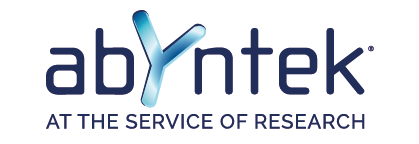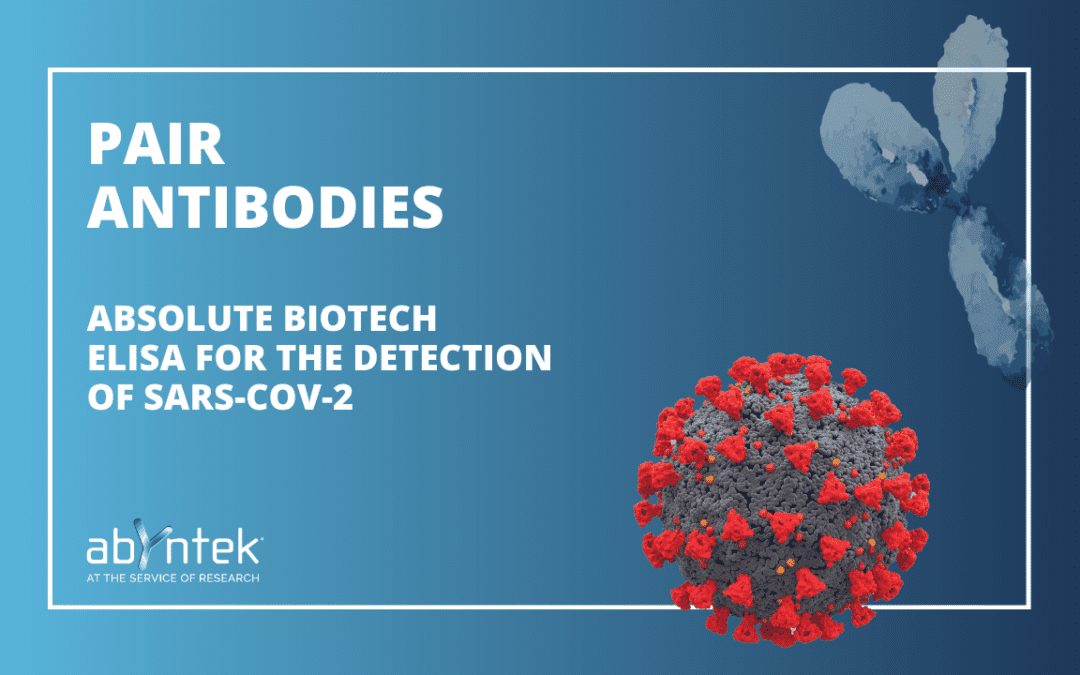The brands of the Absolute Biotech group, distributed by Abyntek Biopharma in Spain and Portugal, have developed a new pair of antibodies compatible with ELISA for SARS-COV-2 research.
The partnership combines Absolute Antibody’s recombinant antibody expertise and robust anti-coronavirus antibody catalog with Everest’s experience in goat polyclonal antibodies to provide antibodies that have been individually curated for their performance in detecting SARS-CoV-2 spike proteins. The antibody set allows researchers to benefit from the affordable reliability of goat polyclonal antibodies as their capture antibody and the specificity and clean data of recombinant engineered antibodies for detection.
The new product (EB-PAIR-001-HRP) features the Everest goat anti-SARS-CoV-2 spike protein S1 Domain (N Terminal) capture antibody (EB13088) and the Absolute Antibody recombinant anti-COVID-19 & SARS-CoV spike glycoprotein antibody (Ab01680-10.0) in a human IgG1 format.
The recombinant antibody, clone CR3022, was widely used during the coronavirus pandemic to evaluate mono- and combination-therapy potential and for serological controls in COVID-19 diagnostic assays; see Figure 1 for its binding curve. The goat polyclonal antibody was utilized during the pandemic for various COVID-19 research applications; see Figure 2 for its immunofluorescence analysis of HEK293 cells infected with SARS-CoV-2 spike protein-expressing plasmid.

Figure 1. Binding curve of anti-COVID-19 & SARS-CoV S glycoprotein antibody CR3022 (Ab01680-10.0) to SARS-CoV-2 Spike Glycoprotein domains S1 and S2 of various origin.
ELISA plate coated with SARS-CoV-2 Spike Glycoprotein (S1), His-Tag (Insect Cells; grey line), SARS-CoV-2 Spike Glycoprotein (S2), His-Tag (Insect Cells; yellow line) and SARS Coronavirus Spike Glycoprotein (S1), His-Tag (HEK293 cells; blue line) (The Native Antigen Company) at concentrations of 5 µg/ml. A 3-fold serial dilution from 41.6 ng/ml was performed using Ab01680-10.0. For detection, a 1:4000 dilution of HRP-labelled anti-human IgG antibody was used.
Together, the antibodies allow you to detect SARS-CoV-2 with confidence
Why Goat Polyclonal and Recombinant Antibodies?
Since its creation in 2000, Everest Biotech has become an ISO 9001:2015 certified expert in antigen affinity purified goat polyclonal antibodies. Polyclonal antibodies have a higher overall affinity due to their ability to bind to multiple epitopes. This makes the use of a polyclonal antibody advantageous as a capture antibody in ELISAs because it effectively widens the net of possible antigens the antibody immobilizes in your ELISA. Then, the recombinant detection antibody uses its wholly defined antigen specificity to narrow down positive results in your assay, leaving you clean and clear data you can trust.
Another advantage of using goat polyclonal antibodies is that goats have a higher antibody concentration in serum than other animals, resulting in cost-effective antibodies. If recombinant engineered antibodies are a new addition to your lab, this new product bundle is a great way to sample the effectiveness of engineered antibodies in a convenient, specifically curated, and economical manner. Or if you are looking at other antibody species, formats, and clonalities, this is a great way to introduce proven goat polyclonal antibodies into your research.
Figure 2. EB13088 Immunofluorescence analysis of paraformaldehyde fixed HEK293 cells transiently transfected with SARS-CoV-2 spike protein expressing plasmid, permeabilized with 0.15% Triton. Primary incubation 1hr (10ug/ml) followed by Alexa Fluor 488 secondary antibody (2ug/ml), showing membrane and cytoplasmic staining. The nuclear stain is DAPI (blue). Negative control: non-transfected HEK293 cells.

Reagents for Coronavirus Research
The human monoclonal antibody clone CR3022 was first described in 2006 as a potential therapy for acute SARS-CoV infection. Then, in early 2020, CR3022 was found to bind potently to SARS-CoV-2 (called 2019-nCoV in the article), not just SARS-CoV, suggesting its effectiveness as a diagnostic tool and possible treatment. In response to these findings, engineers at Absolute Antibody have recombinantly produced CR3022 in a variety of formats, including human IgG1, IgG2, IgG3, IgA, IgM, Fab, and Fab2 fragments—many with modified Fc regions for tailored effector functions. Having myriad human antibody options can enable researchers to more accurately mimic antibody responses seen in COVID-19 infections (Amanat et al. 2020). Additionally, we provide the CR3022 clone in various mouse, rabbit, cat and ferret isotypes for a more complete palette of coronavirus research tools.
The CR3022 clone and the COVID antibody match pair are just two of the COVID research tools we have available. We offer a variety of recombinant coronavirus reagents to support COVID-19 research and diagnostics. All antibodies have been engineered in different human isotypes and subtypes, as well as other species, fragments and engineered Fc domains.

Figure 3. EB-Pair-001-HRP. Antigen: Recombinant Spike S1 protein (2000 ng/ml, 1000 ng/ml, 500 ng/ml, 250 ng/ml, 125 ng/ml, 62.5 ng/ml, 31.25 ng/ml, 0 ng/ml). Blocking with 3% BSA for 2 hours.
Available reagents include:
- Spike glycoprotein and nucleoprotein antibodies (CR3022, CR3009 and CR3018)
- Neutralizing antibodies derived from COVID-19 patients (CV1 and CV30)
- Anti-RBD binders originally generated as synthetic nanobodies
- ACE2 Fc fusion proteins
Additionally, as part of Absolute Biotech, their sister companies offer a wide range of products to support research into SARS-CoV-2 and related topics. Explore how SCICONS™ anti-dsRNA antibodies from other Absolute Biotech brands helped the fight against COVID-19 and review the full breadth of coronavirus-related reagents from Kerafast and LSBio.




